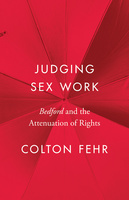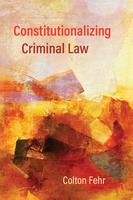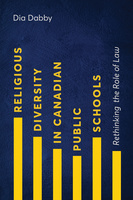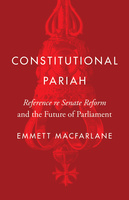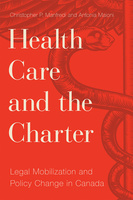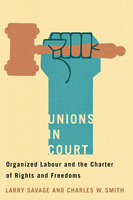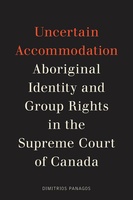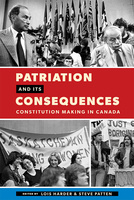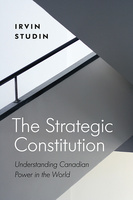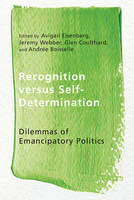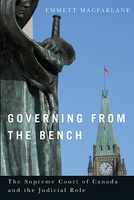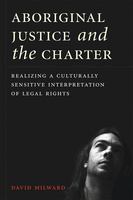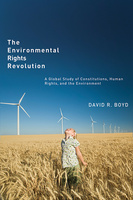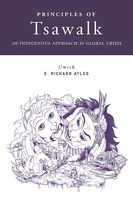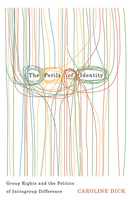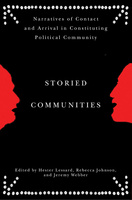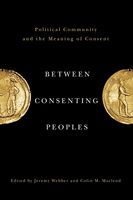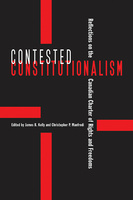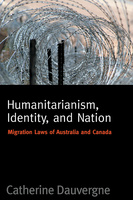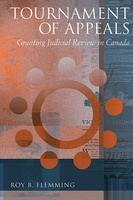Canada’s Surprising Constitution
Unexpected Interpretations of the Constitution Act, 1982
Canada’s Surprising Constitution asks why the Constitution Act, 1982, keeps generating unexpected interpretations and outcomes.
Judging Sex Work
Bedford and the Attenuation of Rights
Judging Sex Work argues that a decision widely considered to be a victory for social justice weakened sex workers’ rights far more than it strengthened them.
Constitutionalizing Criminal Law
Constitutionalizing Criminal Law explains why the Supreme Court of Canada’s jurisprudence considering the constitutionality of criminal laws fails to strike a principled balance between the need to increase the coherency of the criminal law while maintaining the legitimacy of judicial review.
Religious Diversity in Canadian Public Schools
Rethinking the Role of Law
This comprehensive analysis of the legally complex relationship between religion and public schools will compel readers to reconsider the role of law in education.
Constitutional Pariah
Reference re Senate Reform and the Future of Parliament
Constitutional Pariah is the first comprehensive account of the Senate in the aftermath of the landmark Supreme Court decision that resulted in one of the most significant reforms to Parliament in Canadian history.
Privacy in Peril
Hunter v Southam and the Drift from Reasonable Search Protections
This book, the second in the Landmark Cases in Canadian Law series, argues that in subsequent, post-Hunter v Southam decisions, the Supreme Court of Canada has strayed from the principles set out in that case, which were intended to protect the privacy of citizens from encroaching state power.
Health Care and the Charter
Legal Mobilization and Policy Change in Canada
An engaging study of the clash between two iconic Canadian policy instruments – universal, single-payer health care and the Canadian Charter of Rights and Freedoms – and the effects on politics and policy.
Unions in Court
Organized Labour and the Charter of Rights and Freedoms
This book demonstrates how and why labour’s long-standing distrust of the legal system has given way to a Charter-based legal strategy designed to protect workers’ rights and freedoms.
Uncertain Accommodation
Aboriginal Identity and Group Rights in the Supreme Court of Canada
A bold analysis of what happened when Canada attempted to extend group rights to Aboriginal people in the early 1980s and why it went wrong.
Patriation and Its Consequences
Constitution Making in Canada
Patriation and Its Consequences examines the political events and struggles that resulted in the 1981 agreement to patriate the Canadian constitution and sheds light on the political consequences of this key moment in Canadian history.
The Strategic Constitution
Understanding Canadian Power in the World
Bridging the solitudes of constitutional law and international relations, this book offers a brand new interpretation of Canada’s Constitution.
Recognition versus Self-Determination
Dilemmas of Emancipatory Politics
This book re-evaluates the role of recognition in analyzing relations between groups in plural societies, the position of indigenous peoples in settler societies, and the principle of the self-determination of peoples.
Governing from the Bench
The Supreme Court of Canada and the Judicial Role
Governing from the Bench is a comprehensive and illuminating examination of the Supreme Court of Canada that draws on in-depth interviews to reveal the inner workings of this often-misunderstood institution at the heart of Canada’s justice system.
Aboriginal Justice and the Charter
Realizing a Culturally Sensitive Interpretation of Legal Rights
This book explores the tension between Aboriginal justice methods and the Canadian Charter of Rights and Freedoms, while searching for practical ways to implement Aboriginal justice.
The Right to a Healthy Environment
Revitalizing Canada's Constitution
Renowned environmental lawyer David R. Boyd argues that Canada must constitutionalize environmental rights and responsibilities if it hopes to improve its environmental record.
The Environmental Rights Revolution
A Global Study of Constitutions, Human Rights, and the Environment
David Boyd shows that recognition of the right to a healthy environment is not only growing, it is having a profound influence on public policy and environmental protection.
Principles of Tsawalk
An Indigenous Approach to Global Crisis
Hereditary chief Umeek weaves together Nuu-chah-nulth and Western worldviews to revitalize contemporary approaches to the environment and the plight of indigenous peoples.
The Perils of Identity
Group Rights and the Politics of Intragroup Difference
Caroline Dick asks how group identity claims, especially in the courts, obscure significant intragroup differences.
Storied Communities
Narratives of Contact and Arrival in Constituting Political Community
An exploration of the role of storytelling in community and nation building that disrupts the assumption in many works that indigenous and immigrant identities fall into two separate streams of analysis.
Between Consenting Peoples
Political Community and the Meaning of Consent
This book examines how consent might be understood as the foundation of legal and political community, especially in relations between indigenous and nonindigenous peoples.
Constitutional Politics in Canada after the Charter
Liberalism, Communitarianism, and Systemism
The first systematic analysis of general theories about Canada’s post-Charter constitutional evolution.
Contested Constitutionalism
Reflections on the Canadian Charter of Rights and Freedoms
Contested Constitutionalism is a critique of Canadian democracy, judicial power, and the place of Quebec and Aboriginal peoples within the federation, all of which have been altered by the Charter’s introduction in 1982.
Multiculturalism and the Canadian Constitution
The essays illustrate how deeply multiculturalism is woven into the fabric of the Canadian constitution and the everyday lives of Canadians.
Let Right Be Done
Aboriginal Title, the Calder Case, and the Future of Indigenous Rights
Misrecognized Materialists
Social Movements in Canadian Constitutional Politics
A book with provocative implications for students and scholars of social movements and identity politics, Misrecognized Materialists offers a fresh and important perspective on Canada’s constitutional struggles over civic symbolism and identity.
Courts and Federalism
Judicial Doctrine in the United States, Australia, and Canada
Examining recent developments in the judicial review of federalism through detailed surveys of the United States, Australia, and Canada, this book urges political scientists to take courts and judicial reasoning more seriously in their accounts of federal government.
Governing with the Charter
Legislative and Judicial Activism and Framers' Intent
Has parliamentary democracy been weakened by judicial responses to the Charter?
Humanitarianism, Identity, and Nation
Migration Laws in Canada and Australia
Catherine Dauvergne examines the relationship between migration laws and national identities and highlights the role of humanitarianism in this linkage.
Tournament of Appeals
Granting Judicial Review in Canada
Drawing from systematically collected information on the process, applications, and lawyers that has never before been used in studies of Canada’s Supreme Court, this book offers both a qualitatively and quantitatively-based explanation of how Canada’s justices grant judicial review.


